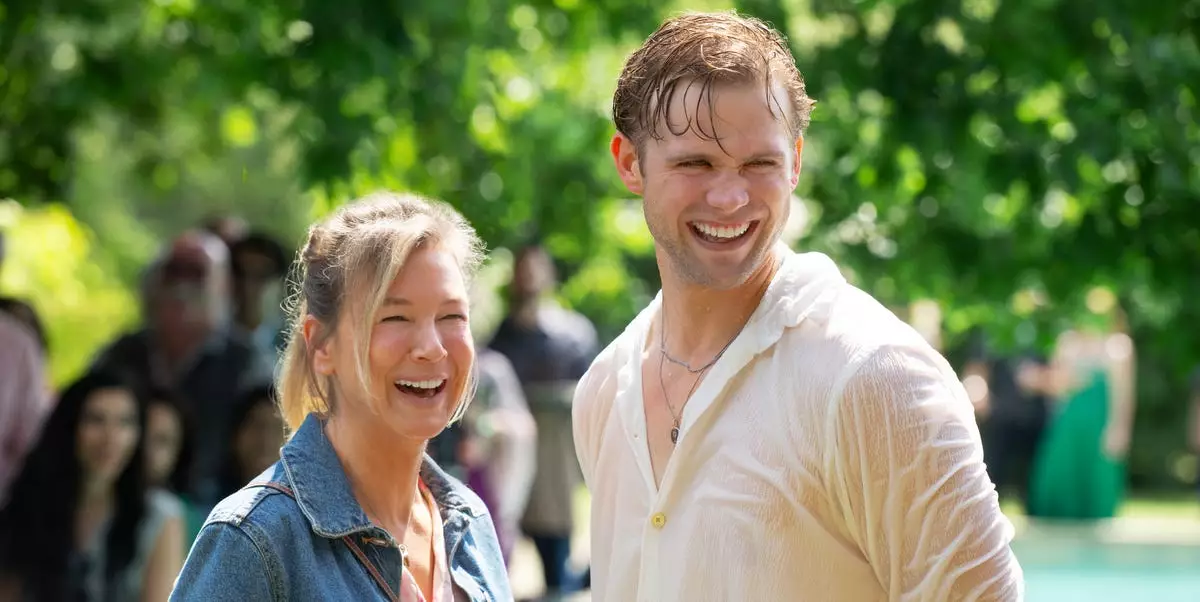After a considerable hiatus from our screens, the lovable yet perpetually clumsy Bridget Jones is set to return, this time exploring the complexities of life and love at fifty. Nearly ten years have passed since “Bridget Jones’s Baby” graced theaters, and Renée Zellweger reclaims her role as the charmingly flawed protagonist in the upcoming film “Bridget Jones: Mad About the Boy.” This new installment is not merely a sequel but an evolution, as it continues the narrative laid out by Helen Fielding in her 2013 novel, also titled “Mad About the Boy.” Set to premiere on February 13—a date that conveniently aligns with Valentine’s Day—this film offers both romantic and comedic elements for audiences who are ready to embrace Bridget’s fresh adventures.
The film presents an emotionally resonant chapter in Bridget’s life marked by profound loss. Following the tragic death of her husband, Mark Darcy, who dies during a charitable mission in Sudan, Bridget is thrust into the tumultuous role of a single mother. The challenges of parenting her two children, Billy and Mabel, while grappling with her sorrow are intricately intertwined, showcasing Bridget’s resilience and her determination to find joy amid despair. This dual struggle between heartache and the desire for connection reflects a universal theme that resonates with many viewers, particularly those navigating similar life phases.
As Bridget journeys through her grief, we witness her cautious foray back into the dating world. Introducing a new character, Roxster, portrayed by Leo Woodall from “The White Lotus,” adds a vibrant dynamic to the narrative. Roxster’s youthful charm offers Bridget a glimpse of lightness amid her struggles, embodying a carefree summer fling that contrasts sharply with her responsibilities as a mother. Simultaneously, Bridget finds herself attracted to her son’s science teacher, Mr. Wallaker (played by Chiwetel Ejiofor), effectively putting Bridget in a classic love triangle that echoes her earlier romantic escapades.
Moreover, fan-favorite characters such as Daniel Cleaver, portrayed by Hugh Grant, are set to reappear, adding layers of nostalgia while saddling Bridget with the complexities of rekindled connections. This blending of the old with the new not only serves to reinvigorate the franchise but also emphasizes the growth and change Bridget has experienced over the years. Adding flair to the ensemble, Emma Thompson returns as Bridget’s gynecologist, offering comedic relief while providing sage advice to the struggling protagonist.
The return of supporting characters like Bridget’s parents and her loyal friends heightens the film’s relatability. The importance of friendship and family becomes especially pronounced during times of hardship, something that resonates profoundly with audiences who have followed Bridget’s journey for years. Their inclusion in this latest installment anchors Bridget’s story in a community of love, support, and chaotic camaraderie.
With the excitement surrounding Bridget’s return, Zellweger herself has expressed mixed feelings about the future of her character. While she relishes stepping back into Bridget’s whimsical yet heart-wrenching world, she has hinted at this film potentially being the last chapter of Bridget’s story. “I don’t think I’ll ever let go of Bridget,” she remarked, revealing the deep-seated connection she has with the character.
Despite the nostalgia, the idea of closing the door on Bridget’s escapades sparks contemplation about the evolution of romantic comedies in contemporary society. As streaming platforms like Peacock become the new home for cinematic releases, the franchise’s shift from theaters to digital viewing mirrors broader changes in audience consumption habits.
As “Bridget Jones: Mad About the Boy” prepares to make its entrance into the cultural landscape, it promises to be more than just another romantic comedy. It serves as a poignant exploration of love, loss, and resilience for a generation of viewers who have grown alongside its beloved heroine. Whether this will mark the final chapter for Bridget remains uncertain, but her journey continues to resonate as a powerful reminder of the complexities of modern womanhood. As audiences gather to watch Bridget navigate her new life, they will undoubtedly root for her to embrace all the beautiful messiness that comes with starting anew.

